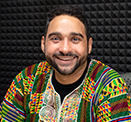
Last year my Christmas got disrupted. My family gathered for Christmas Eve dinner with another family that we walk in relationship with in our church. This family lives in the projects and deals with every form of systemic injustice and racism imaginable. During our dinner, one of their family members confessed some intense secrets that launched us into four hours of screaming, crying, confession, lament, counseling, and prayer. During the first hour, all I could feel was frustration that our Christmas traditions were being disrupted. Around the second hour, the Holy Spirit began to realign my heart so that I could discern what she was doing. I’m beginning to learn about the importance of disruption in the accomplishment of the Lord’s purposes.
Ephrem the Syrian is the most famous author in the history of the Syriac language, and he did theology in the form of an indigenous Syrian style of communal poetry called madrashe. In his madrashe reflecting on the birth of Jesus, Ephrem brings attention to the generations that longed to see the advent of the Messiah: “Who is able to glorify the true Son who rises for us, whom just people yearned to see in their lifetimes? Adequate to the praising of the Son of Truth that has risen to us?” Ephrem leads his Syrian congregation to celebrate the reality that the church lives in the privileged position of having seen the Lord come in the person of Jesus. He goes on to teach how this reality draws us to stand in solidarity with the poor and oppressed who continue to experience daily disruption: “On this day when the Rich One became poor for our sake, let the rich person also make the poor person a sharer at their table. On this day a gift came to us without our asking for it; let us then give alms out to those who cry out and beg from us. This is the day when the high gate opened to us for our prayers.”1
This reminds me of how Christmas has been disrupted since the beginning. Joseph and Mary were forced to leave their home because of a Roman emperor flexing his swagger with an empire-wide census. When they reached Bethlehem, there was no room for them in the inn, so our savior was born around animals and the smell of dung. Yet in the midst of this, the birth of the true king was celebrated by the heavenly principalities alongside the most marginalized of the earth.2 As we prepare for what might be the weirdest Christmas in any of our lifetimes, let us remember our savior who is El-with-Us in the most disrupted of circumstances. Let us also remember, along with Ephrem, that we have the privilege of living in the days of the resurrected messiah. Let us celebrate the disrupted birth of our savior as our disruption brings us ever so slightly into the perpetual disruption of the most marginalized of our world, with whom our savior identifies and with whom we stand in solidarity.
Vince Bantu is assistant professor of church history and Black church studies at Fuller. He has years of pastoral experience in African American, Asian American, and Hispanic churches, and his research interests include African Christianity, Semitic and Egyptian languages, racial reconciliation, and community development.
Last year my Christmas got disrupted. My family gathered for Christmas Eve dinner with another family that we walk in relationship with in our church. This family lives in the projects and deals with every form of systemic injustice and racism imaginable. During our dinner, one of their family members confessed some intense secrets that launched us into four hours of screaming, crying, confession, lament, counseling, and prayer. During the first hour, all I could feel was frustration that our Christmas traditions were being disrupted. Around the second hour, the Holy Spirit began to realign my heart so that I could discern what she was doing. I’m beginning to learn about the importance of disruption in the accomplishment of the Lord’s purposes.
Ephrem the Syrian is the most famous author in the history of the Syriac language, and he did theology in the form of an indigenous Syrian style of communal poetry called madrashe. In his madrashe reflecting on the birth of Jesus, Ephrem brings attention to the generations that longed to see the advent of the Messiah: “Who is able to glorify the true Son who rises for us, whom just people yearned to see in their lifetimes? Adequate to the praising of the Son of Truth that has risen to us?” Ephrem leads his Syrian congregation to celebrate the reality that the church lives in the privileged position of having seen the Lord come in the person of Jesus. He goes on to teach how this reality draws us to stand in solidarity with the poor and oppressed who continue to experience daily disruption: “On this day when the Rich One became poor for our sake, let the rich person also make the poor person a sharer at their table. On this day a gift came to us without our asking for it; let us then give alms out to those who cry out and beg from us. This is the day when the high gate opened to us for our prayers.”1
This reminds me of how Christmas has been disrupted since the beginning. Joseph and Mary were forced to leave their home because of a Roman emperor flexing his swagger with an empire-wide census. When they reached Bethlehem, there was no room for them in the inn, so our savior was born around animals and the smell of dung. Yet in the midst of this, the birth of the true king was celebrated by the heavenly principalities alongside the most marginalized of the earth.2 As we prepare for what might be the weirdest Christmas in any of our lifetimes, let us remember our savior who is El-with-Us in the most disrupted of circumstances. Let us also remember, along with Ephrem, that we have the privilege of living in the days of the resurrected messiah. Let us celebrate the disrupted birth of our savior as our disruption brings us ever so slightly into the perpetual disruption of the most marginalized of our world, with whom our savior identifies and with whom we stand in solidarity.

Vince Bantu is assistant professor of church history and Black church studies at Fuller. He has years of pastoral experience in African American, Asian American, and Hispanic churches, and his research interests include African Christianity, Semitic and Egyptian languages, racial reconciliation, and community development.
Pamela Ebstyne King, Peter L. Benson Associate Professor of Applied Developmental Science, meditates on the birth of Christ as an invitation for us to join in God’s restorative work in the world.